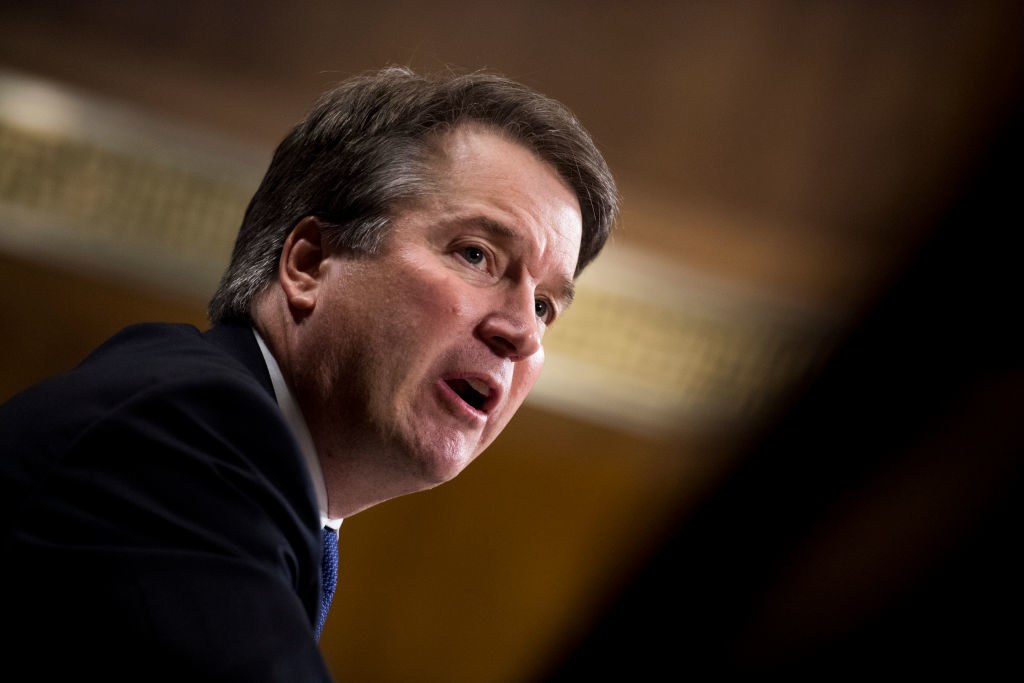Brett Kavanaugh Has Been Confirmed to the Supreme Court

Americans are poised for the dawn of a new era in federal justice as one of the most divisive Supreme Court nominations in modern history comes to a close. As protestors screamed and shouted from the public gallery, the Senate voted to confirm Brett Kavanaugh three months after his selection by President Donald Trump—weeks marked by public protests that came to a head after three women accused the judge of past sexual assaults.
Republicans, looking to boost their party ahead of November’s midterm election, steamed ahead with the nomination. Finally, on Saturday, the Senate voted 50 to 48 to make Kavanaugh the 114th justice of the high court. Notably, Republican Sen. Lisa Murkowski, from Alaska, voted present instead of “no” as a favor to Sen. Steve Daines, a Republican from Montana, who was was attending his daughter’s wedding and would have voted yes.
“When a senator is necessarily absent (for example, attending their daughter’s wedding), they can ‘pair’ with another senator who is voting the opposite way,” a spokesman for Senate Majority Leader Mitch McConnell told reporters Friday night.
“I have extended this as a courtesy to my friend. It will not change the outcome of the vote,” Murkowski said Friday night on the Senate floor. “But I do hope that it reminds us that we can take very small, very small steps to be gracious with one another and maybe those small, gracious steps can lead to more.”
One of the judge’s accusers, California college professor Dr. Christine Blasey Ford, galvanized supporters—and critics—by telling the Senate Judiciary Committee under oath in a September testimony that a drunk Kavanaugh tried to force himself on her at a high school party in the ’80s. The judge denied the accusations with force that sometimes veered into belligerence. Kavanaugh, of course, was no longer a lock: Senate Judiciary Democrats interrogated him about Ford’s accusations. Republicans railed against maligning a man never convicted of a crime. #MeToo activists saw a moment to speak out—and to not repeat the scrutiny that Anita Hill endured, who in 1991 accused SCOTUS nominee Clarence Thomas of sexual harassment.
Following Ford’s testimony, the battle over Kavanaugh reached another peak as the Senate voted 51-49 on Friday to push past a procedural hurdle and advance his appointment. Republican senators mostly fell along from party lines, with on-the-fence senators including Jeff Flake, Susan Collins, and Joe Manchin, voting to move Kavanaugh forward to a full vote. An exception came with Murkowski, a crucial swing vote who voted not to advance the embattled nominee ahead.
The Senate Judiciary Committee had initially planned to weigh in on Kavanaugh’s confirmation on Sept. 28, less than 24 hours after the country had been rocked by emotional testimony from both Kavanaugh and Ford. However, things took a dramatic turn when Arizona Senator Jeff Flake signaled he would only vote to confirm Kavanaugh if an FBI investigation was conducted into the allegations.
The investigation was completed this week. It looked into Ford’s claims that Kavanaugh had held her down and covered her mouth with his hand when they were in high school in 1982. The FBI also examined the accusations of Deborah Ramirez, a Yale classmate of Kavanaugh’s who accused him of exposing himself to her at a party. The summary of the FBI’s findings said that the allegations could not be corroborated.
“The Supplemental Background Investigation confirms what the Senate Judiciary Committee concluded after its investigation: there is no corroboration of the allegations made by Dr. Ford or Ms. Ramirez,” the summary reads.
Chuck Grassley, the Republican chairman of the Senate Judiciary Committee, referenced the summary on Friday to assert Kavanaugh’s innocence, insisting that an unfair smear campaign had been leveled against Trump’s nominee.
However, Democratic senators suggested the FBI investigation had been limited and curtailed by the White House. Multiple people, including former classmates of Kavanaugh’s, had said that they wanted to provide statements to the FBI but could not reach the organization. The executive summary had detailed the 10 people that the FBI interviewed, including Kavanaugh’s childhood friends Mark Judge and PJ Smyth, and Dr. Ford’s friend Leland Keyser—all people Dr. Ford said had been at the party during which the assault occurred. According to early reports, the FBI chose not to interview Dr. Ford or Kavanaugh again.
In addition to the allegations against him, Kavanaugh has also rattled pro-choice supporters with some of his past positions a judge. What comes across his desk as a Supreme Court justice remains to be seen, but what is coming up are the midterm elections. Read up on your voting rights here.
MORE: Here Are the Senate Women at the Center of the Brett Kavanaugh Debate
